Britain Sanctions Iranian Officials Over human Rights Violations
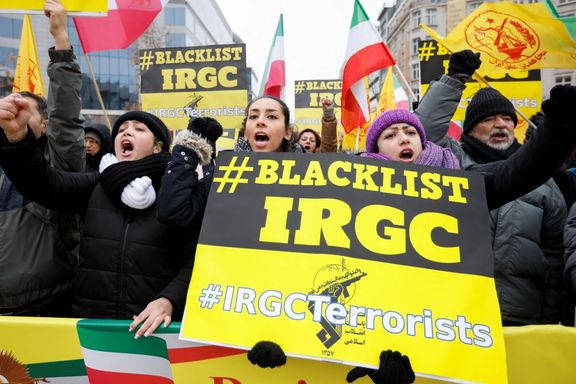
Britain on Monday sanctioned more Iranian figures over human rights violations including the recent execution of British-Iranian dual national Alireza Akbari.

Britain on Monday sanctioned more Iranian figures over human rights violations including the recent execution of British-Iranian dual national Alireza Akbari.
The sanctions included an asset freeze on Iranian deputy prosecutor general Ahmad Fazelian, who the British foreign office said was responsible for an unfair judicial system that used the death penalty for political purposes.
Others sanctioned include Kiyumars Heidari, commander in chief of Iran's ground forces; Hossein Nejat, deputy commander of the Islamic Revolutionary Guard Corps; the Basij Resistance Force and its deputy commander, Salar Abnoush.
Iran's security forces mainly controlled by the Revolutionary Guard and supported by the hardliner judiciary have killed around 500 civilians since anti-regime protests erupted in September.
The Basij Cooperative Foundation, linked to the Basij militia, and Qassem Rezaei, deputy commander of Iran's law enforcement forces, were also sanctioned.
"Those sanctioned today, from the judicial figures using the death penalty for political ends to the thugs beating protestors on the streets, are at the heart of the regime’s brutal repression of the Iranian people," British foreign minister James Cleverly said.
"The UK and our partners have sent a clear message through these sanctions that there will be no hiding place for those guilty of the worst human rights violations."
The European Union also imposed new sanctions on Iranian regime officials and entities for rights violations and the delivery of killer drones to Russia.
With reporting by Reuters
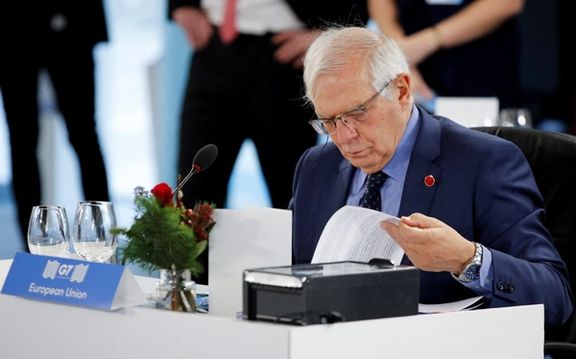
The European Union cannot list Iran's IRGC as a terrorist entity until an EU court has determined that they are, the block's foreign policy chief said Monday.
EU ministers, however, on Monday agreed on a new package of sanctions against Iran, the Swedish EU presidency said.
"Ministers adopted a new package of sanctions against Iran, targeting those driving the repression. The EU strongly condemns the brutal and disproportionate use of force by the Iranian authorities against peaceful protesters," the presidency said in a tweet, without giving further detail.
Spokesman of Iran foreign ministry Nasser Kanaani in Tehran had said earlier in the day that the Iranian government is not without option if the EU lists the IRGC as a terrorist organization. He added that any move against the Revolutionary Guard will be regarded as a hostile act against the security of the Islamic Republic and “its results will affect the offenders.”
Iranian officials, apparently concerned over a possible move by the EU following an overwhelming vote by the European Parliament last week, have been implicitly threatening the block with violent consequences.
The European Parliament has called on the EU to list the Revolutionary Guards as a terrorist entity, blaming it for the repression of domestic protests and the supply of drones to Russia.
"It is something that cannot be decided without a court, a court decision first. You cannot say I consider you a terrorist because I don't like you," Josep Borrell, the EU's high representative for foreign affairs, told reporters as he arrived for a meeting of EU foreign ministers in Brussels.
He said the court of an EU member had to issue a concrete legal condemnation before the EU itself could act.
There have been numerous Iranian terror acts in Europe, where courts have indicted top officials. In addition, IRGC’s record in organizing attacks elsewhere are well-documented. Critics say that Borrell is focused on re-starting nuclear talks with Iran after the previous long round of negotiations in 2021-2022 ended last September without success.
The United States has said it is not pursuing the revival of the 2015 nuclear deal, or the JCPOA, and instead its attention is on the popular movement in Iran and on Tehran’s supply of kamikaze drones to Russia.
The IRGC was set up shortly after the 1979 Islamic Revolution to protect the Shi’ite clerical ruling system and provide a counterweight to the regular armed forces.
It has an estimated 125,000-strong military with army, navy and air units. It also commands the Basij religious militia, a volunteer paramilitary force loyal to the clerical establishment which is often used to crack down on anti-government protests.
Arriving at the same meeting, German Foreign Minister Annalena Baerbock said the EU must talk about putting the IRGC on the sanctions list.
"We still see in Iran a brutal regime against its own population. The Iranian regime, the Revolutionary Guards terrorize their own population day after day," Baerbock said.
Tehran has also detained several European nationals and the bloc has become increasingly critical of its continuing violent crackdown on protesters and the transfer of Iranian drones to Russia.
The Iranian diaspora in Europe has become politically active since popular protests broke out last year and has been putting pressure on European politicians to act against the clerical regime in Iran.
With reporting by Reuters
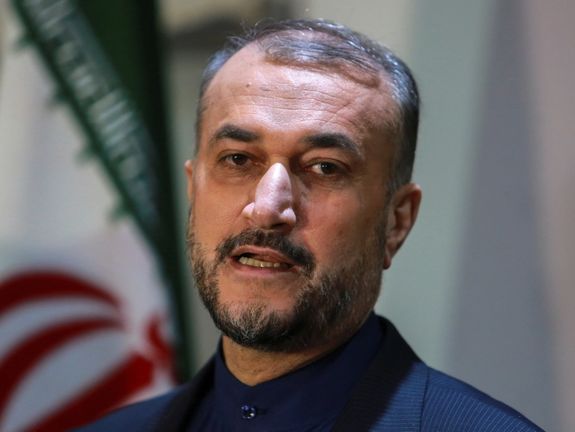
Iran’s foreign minister says EU officials including Josep Borrell have stated they are not looking to implement a proposed resolution against the Revolutionary Guard.
In an interview with ICANA new agency about the recent resolution adopted by the European Parliament to designate the IRGC as a terrorist organization, Hossein Amir-Abdollahian said “the European Parliament has made an emotional decision and rationality did not rule their meeting”.
“We have been trying to get the European Union to change its direction for months, and …they concluded that this issue should not be raised in the European Union as the decisions of the council of ministers are binding. However, they passed the resolution in the European Parliament as a show,” he added.
The Iranian foreign minister claimed that according to conversations with Joseph Burrell and the rotating president of the European Union, they are not seeking to implement the resolution and that the resolution is only an expression of the feelings of some European Parliament members.
Regarding the possibility of Iran's withdrawal from the NPT by expelling IAEA inspectors he threatened that “a small number of European political leaders have no experience in diplomacy, including the German foreign minister, so if they do not correct their positions, anything is conceivable.”
Iranians launched a movement to ask European politicians to designate the IRGC as a terror group, as it was responsible for leading most of the security forces who killed, maimed and arrested protesters.
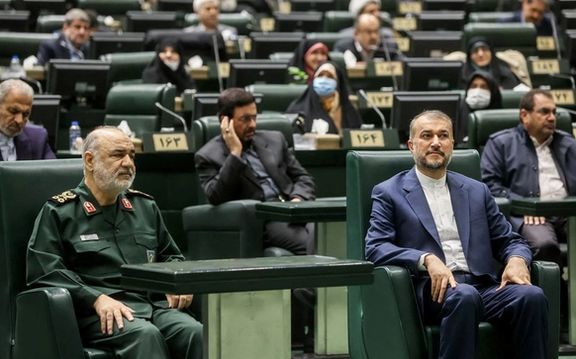
The Islamic Republic of Iran upped the ante in its threats to Europe over the proposed listing of IRGC as a terrorist organization, being considered by the EU.
The parliament in Tehran held a special meeting Sunday with foreign minister Hossein Amir-Abdollahian and IRGC commander Hossein Salami attending.
After the meeting, parliament speaker Mohammad Bagher Ghalibaf (Qalibaf) issued a statement saying, “We will have actions on the agenda against European armed forces in the region.”
This clear threat comes as Iran and its proxy forces in Iraq and Syria have been targeting US military forces with missiles, rockets and mortars since 2019. These attacks were the immediate reason why in January 2020 former President Donald Trump ordered the killing of Qassem Soleimani, IRGC’s commander for extra-territorial operations.
Ghalibaf also declared that “This parliament is ready to designate European armed forces n the region as terrorist.” He added that if the IRGC is designated, “Europe will pay a full price for that.”
The issue of Europe listing the IRGC emerged in recent weeks as the Iranian regime has killed more than 500 people during popular protests that started in September, after the death of Mahsa Amini in hijab police custody.
Iranians launched a movement to ask European politicians to designate the IRGC as a terror group, as it was responsible for leading most of the security forces who killed, maimed and arrested protesters. The campaign was to an extent successful, bringing together European lawmakers from various groups and parties.
Last week, the European Parliament passed a resolution urging the Council of Europe to declare the Revolutionary Guard a terrorist organization.
It is by no means certain that the Europe will take this step, but some countries such as the United Kingdom might act.
The threats coming from the Iranian regime do have a deterrent purpose, but Iranian officials know there is little chance for the European Union to designate the Revolutionary Guard. If the EU simply announces partial sanctions on the IRGC, the regime can then claim victory that its threats worked.
One member of parliament Sunday made the highly questionable threat that the Islamic Republic can “limit navigation for European vessels” in the Persian Gulf’s Hormuz Strait. However, Iran has attacked foreign shipping in the region, using mines and drones, and has also boarded and impounded some tankers.
The political-ideological commissar of the IRGC also threatened energy shipments form the Persian Gulf, a threat Tehran officials including former presidents have made on some occasions.
Foreign minister Amir-Abdollahian tweeted after the parliamentary session that the Europe by passing the parliament resolution against the IRGC “shot itself in the foot.” He also did not rule out leaving the Nuclear Non-Proliferation Treaty (NPT) when asked by a reporter to say what Iran would do if the EU goes ahead with listing the IRGC.
In addition to the violent and deadly suppression of the protests, Tehran has been supplying kamikaze drones to Russia used in attacks on Ukrainian civilian targets. Many European politicians see this as an attack on Europe and together with United States have demanded Iran stop sending weapons to Russia.
With the serious deterioration in ties, it seems much less likely that the West would reopen nuclear talks with Tehran which were suspended last September after the US rejected what it said were extraneous demands by Tehran.
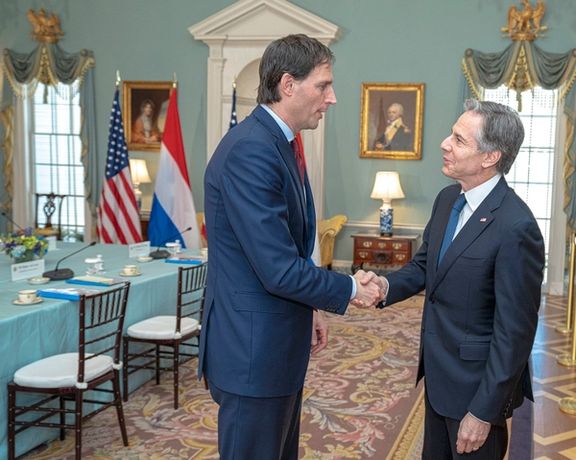
As the European Council is set to decide about European Parliament’s call to list Iran’s Revolutionary Guard as a terror group, the Netherlands has already expressed its support.
Dutch Foreign Minister Wopke Hoekstra said in a tweet on Thursday that “The Netherlands is strongly in favour of listing the IRGC as an entity, a step that requires the joint commitment of EU member states.”
He added that he held talks with High Representative of the EU for Foreign Affairs and Security Policy Josep Borrell about Russia and Iran.
“We also addressed the grave human rights violations in Iran,” he said, noting that “We need to continue to sanction those responsible.”
Hoekstra also said he will also hold talks with German Foreign Minister Annalena Baerbock to address this issue at the upcoming EU Foreign Affairs Council.
The Dutch foreign minister also held talks with US Special Envoy for Iran Robert Malley. “Productive meeting with Foreign Minister Hoekstra. We discussed our common steps to confront Iran's human rights abuses and counter its provision of weapons to Russia for use in its brutal war of aggression against Ukraine,” Malley said.
Although the European Parliament overwhelmingly passed the non-binding resolution on January 19, it cannot decide to designate the IRGC, which is an issue within the purview of the EU Council, comprised of ministers of each EU country. If the resolution garners enough support, it is then upon the national governments of the EU member states to make the final decision. The listing of the IRGC must have a unanimous vote by all 27 EU members in the EU Council.
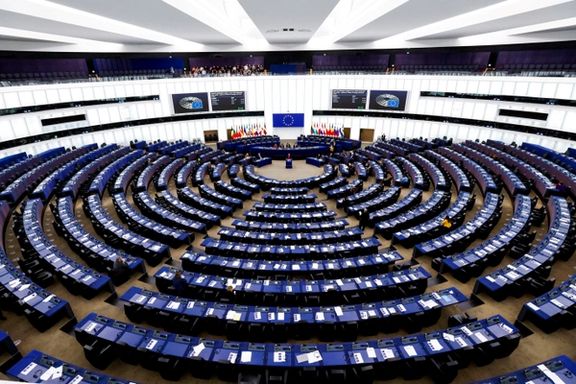
While many Iranians welcomed the European Parliament’s resolution that calls on EU to list the Revolutionary Guard as a terrorist group, regime officials have threatened to respond.
After the European Parliament overwhelmingly passed the resolution Thursday that may eventually lead to the designation of the IRGC, people on social media started to congratulate each other, describing it as yet another victory for their revolt against the clerical regime.
Since the beginning of the current wave of antigovernment protests ignited by a Iranian young woman – Mahsa Amini – the Iran’s government is becoming more isolated in the international community. So far, the Islamic Republic was voted out from the United Nations Commission on the Status of Women (CSW) for policies contrary to the rights of women and girls in December. Another step was by the Geneva-based UN Human Rights Council’s decision on November 24 to launch an independent investigation into the regime’s deadly repression of protests that has killed around 500 civilians, including about 60 children. Several rounds of sanctions by the European Union, the US, Canada and others also targeted officials and entities involved in the crackdown.
According to social media videos, people in some Kurdish cities, including Saqqez – the hometown of Amini -- and Mahabad, came to the streets and rejoiced with fireworks following the approval of the resolution.
Videos sent to Iran International from different cities such as Qom – home to Iran’s biggest seminary -- and the southern city of Bandar Abbas show people distributing candies to celebrate the decision. In one video, someone said that they are watching the European Parliament’s session live on Iran International TV, adding that it is more exciting than the World Cup matches.
Meanwhile, Islamic Republic’s officials, who had started threatening Europe even before the vote, have intensified their rhetoric against European countries over the decision.
Foreign Ministry spokesman Nasser Kanaani said the reason for the designation of IRGC as a terrorist organization is that Europe is infuriated over the IRGC’s leading role in the fight against terrorism. “The reason behind the anger of the ‘global club of terrorists’ is crystal clear. The IRGC is the world’s largest counter-terrorism institution,” he wrote in a tweet on Friday.”
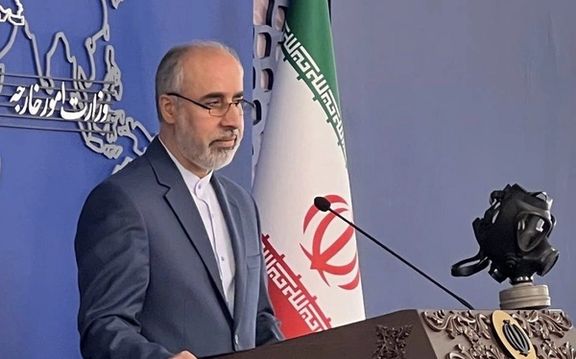
In a statement on Friday, the Army condemned the move, claiming that it exposed the enemies’ grudge against the Islamic establishment in Iran. “The measure of the European Parliament, which claims to be fighting terrorism, against an anti-terrorist institution is out of their desperation and failure in supporting recent riots in Iran,” read the statement.
Hardliner Iranian lawmaker Mohammad Esmail Kowsari, himself a former IRGC commander, said on Friday, "One should ask where the IRGC has committed terrorist acts. They conspired to overthrow the Islamic Republic and the IRGC foiled it." Vowing that the parliament will announce its retaliatory measures on Sunday, he asked, “What part of the IRGC is a terrorist group?”
Criticizing the motion, Speaker of Iran’s parliament, Mohammad Bagher Ghalibaf, said that “If the European Union makes such a decision and lists the Guards as a terrorist organization, it means that the European Union acts as a supporter of terrorism, because the IRGC is the biggest and most successful anti-terrorist entity.”
The whole argument of the Islamic Republic in defense of the IRGC – which has armed proxies in many countries across the region – is its limited role in the battle against the ISIS. But in fact, IRGC was building its own Shiite militant proxy network and to an extent fought against the Sunni extremist group.
The European Parliament cannot decide to designate the IRGC because the terrorists list is not a list decided by the Parliament itself but by the EU Council, comprised of ministers of each EU country. If the resolution garners enough support, it is then upon the national governments of the EU member states to make the final decision. The listing of the IRGC must have a unanimous vote by all 27 EU members in the EU Council.